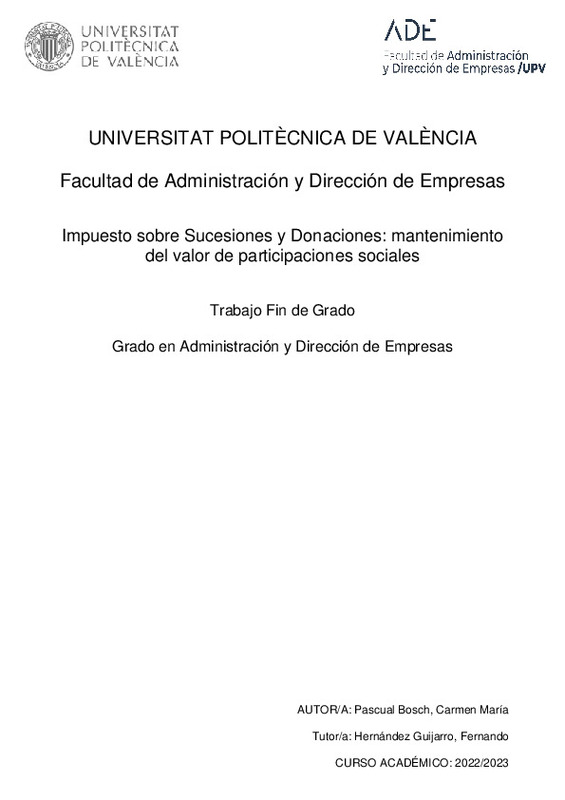|
Resumen:
|
[ES] En el presente trabajo tiene por objeto el análisis del Impuesto sobre Sucesiones y Donaciones, profundizando en cada CCAA, para posteriormente, examinar un caso real sobre el derecho a la reducción en el ISD en el ...[+]
[ES] En el presente trabajo tiene por objeto el análisis del Impuesto sobre Sucesiones y Donaciones, profundizando en cada CCAA, para posteriormente, examinar un caso real sobre el derecho a la reducción en el ISD en el caso del mantenimiento de las participaciones sociales.
Comenzaremos analizando el marco teórico, centrándose en la contextualización histórica y el análisis profundo de los aspectos esenciales de esta figura tributaria, y, en segundo lugar, la normativa estatal por la que se rige el impuesto actualmente. De esta manera tendremos una visión global del hecho que se tratará en el presente trabajo.
Seguidamente, nos centramos en los beneficios fiscales existentes; por ser familiar del causante, por ser la vivienda habitual del causante y, especialmente, por ser una empresa familiar (de las que están exentas de Patrimonio), etc. Algunas de estas reducciones, requieren que se cumplan ciertos requisitos, como es el caso de la transmisión de participaciones en las sociedades familiares, en la cual se exige que la sociedad se mantenga durante diez años. Esto implica que durante el periodo de diez años no se puede ni vender participaciones sociales, ni liquidar la sociedad, o cualquier actividad que implique una descapitalización con transferencia a los socios (como puede ser una reducción de capital).
Y concluiremos realizando un supuesto empírico en el que se plantea un supuesto para mostrar las posibles soluciones para la mejor decisión de cara a poder disfrutar del beneficio fiscal en una sucesión o donación en participaciones en empresa familiar.
La principal fuente de información ha sido la que dispongo en el despacho de asesores fiscales donde trabajo. También las webs de la Agencia Valenciana y Estatal de la Administración Tributaria, a la Ley 29/1987, la cual aporta toda la información relevante y necesaria para poder analizar el Impuesto de Sucesiones y Donaciones. Además, se han analizado artículos, trabajos de otros compañeros, sentencias del tribunal supremo y por supuesto libros relacionados con la materia fiscal.
[-]
[EN] The purpose of this paper is to analyze the Inheritance and Gift Tax, delving into each CCAA, to later examine a real case on the right to a reduction in the ISD in the case of maintaining social shares.
We will ...[+]
[EN] The purpose of this paper is to analyze the Inheritance and Gift Tax, delving into each CCAA, to later examine a real case on the right to a reduction in the ISD in the case of maintaining social shares.
We will begin by analyzing the theoretical framework, focusing on the historical contextualization and in-depth analysis of the essential aspects of this tax figure, and, secondly, the state regulations by which the tax is currently governed. In this way we will have a global vision of the fact that will be dealt with in the present work.
Next, we focus on the existing tax benefits; for being a family member of the deceased, for being the habitual residence of the deceased and, especially, for being a family business (of those that are exempt from Patrimony), etc. Some of these reductions require that certain requirements be met, such as the transfer of shares in family companies, in which the company is required to be maintained for ten years. This implies that during the ten-year period you can neither sell shares, nor liquidate the company, or any activity that implies a decapitalization with a transfer to the partners (such as a capital reduction).
And we will conclude by making an empirical assumption in which an assumption is made to show the possible solutions for the best decision in order to be able to enjoy the tax benefit in a succession or donation in shares in a family business.
The main source of information has been the one I have at the tax advisors office where I work. Also the websites of the Valencian and State Agency of the Tax Administration, to Law 29/1987, which provides all the relevant and necessary information to be able to analyze the Inheritance and Donations Tax. In addition, articles, works by other colleagues, Supreme Court rulings and, of course, books related to tax matters have been analyzed.
[-]
|







